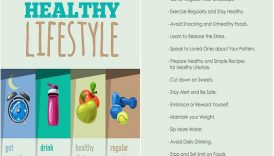10 Ways to Stay Healthy for Life: Expert Tips and Tricks

Life can often feel like a juggling act, especially as we navigate the demands of work, family, and personal aspirations. The quest for a healthier lifestyle is universal, yet many struggle to find the right balance. This article aims to provide practical strategies for holistic well-being that can seamlessly fit into the daily routine.
- 10 Ways to Stay Healthy for Life: Expert Tips and Tricks
- The Importance of Holistic Health
- Maintaining a Balanced Diet
- Importance of Nutrient-Rich Foods
- Hydration Tips
- Regular Exercise
- Cardiovascular Workouts
- Strength Training Benefits
- Quality Sleep
- Creating a Bedtime Routine
- Improving Sleep Environment
- Stress Management Techniques
- Meditation and Mindfulness
- Time Management Strategies
- Social Connections and Support
- Building Meaningful Relationships
- Joining Community Groups
- Regular Health Check-ups
- Importance of Preventive Screenings
- Establishing a Relationship with a Healthcare Provider
- Mental Health Awareness
- Seeking Professional Help
- Practicing Self-Care
- Limiting Harmful Habits
- Quitting Smoking
- Moderating Alcohol Consumption
- Setting Realistic Health Goals
- SMART Goal Setting
- Tracking Progress and Adjusting Accordingly
The Importance of Holistic Health
Taking a comprehensive approach to health means considering various aspects of life. Here are a few dimensions that contribute to overall wellness:
- Physical Health: This encompasses nutrition, exercise, and sleep.
- Mental Well-being: Managing stress and maintaining positive mental health.
- Social Connections: Building relationships that support and uplift.
By focusing on these interconnected areas, individuals can cultivate a lifestyle that not only benefits their body but also enriches their mind and soul. The journey towards a balanced and fulfilling life starts here!
Maintaining a Balanced Diet
As we embark on our health journey, one of the cornerstones is maintaining a balanced diet. The food we consume plays a significant role in our overall well-being and can dramatically impact our energy levels and mood.
Importance of Nutrient-Rich Foods
Nutrient-rich foods are vital for fueling our bodies and providing the essential vitamins and minerals we need. For instance, think about how you feel after a wholesome meal of grilled salmon, quinoa, and steamed broccoli versus processed fast food. Consider incorporating:
- Fruits and Vegetables: Aim for a rainbow on your plate. Each color represents different nutrients.
- Whole Grains: Opt for brown rice or whole-grain bread.
- Lean Proteins: Include sources like chicken, beans, and tofu.
Hydration Tips
Equally important is staying hydrated. Water enhances digestion and keeps skin healthy, yet many forget to drink enough throughout the day. Try these simple hydration tips:
- Carry a Reusable Water Bottle: Keep it with you as a constant reminder.
- Infuse Water with Fruits: Add slices of lemon or cucumber for flavor.
- Set Reminders: Use your phone to alert you every hour to take a sip.
By focusing on nutrient-rich foods and proper hydration, individuals can create a solid foundation for a balanced diet that supports both physical and mental health.
Regular Exercise
Continuing on our path to a healthier lifestyle, regular exercise becomes a non-negotiable element of overall well-being. Physical activity not only strengthens the body but also boosts mental health, ensuring that we feel our best both inside and out.
Cardiovascular Workouts
Cardio workouts are excellent for keeping the heart healthy and improving lung capacity. Think about how invigorated you feel after a brisk walk or a lively dance class! Here are some popular options:
- Running or Jogging: Great for burning calories and improving endurance.
- Cycling: Low-impact yet effective for cardiovascular fitness.
- Swimming: A fun way to work out while being easy on the joints.
Aim for at least 150 minutes of moderate cardio each week to reap the maximum benefits.
Strength Training Benefits
While cardio is crucial, strength training complements it beautifully. Building muscles not only helps enhance metabolism but also increases bone density. Consider integrating:
- Bodyweight Exercises: Push-ups, squats, and lunges can be done anywhere.
- Resistance Bands: Versatile tools that add extra challenge.
- Weightlifting: Incorporate free weights or machines at the gym.
By combining cardiovascular workouts with strength training, individuals can unlock a comprehensive fitness routine that fosters overall health and resilience.
Quality Sleep
After establishing a routine of regular exercise, it’s time to focus on another vital aspect of a healthy lifestyle: quality sleep. Though often overlooked, sleep plays a crucial role in physical recovery and mental well-being.
Creating a Bedtime Routine
Developing a consistent bedtime routine can signal to your body that it’s time to wind down. Think of it as a gentle transition from the hustle of the day to a peaceful night’s sleep. Here are some steps to consider:
- Set a Regular Sleep Schedule: Aim to go to bed and wake up at the same time every day.
- Limit Screen Time: Try to avoid screens at least an hour before bed, as the blue light can disrupt melatonin production.
- Incorporate Relaxing Activities: Read a book, practice gentle stretches, or enjoy calming music.
Improving Sleep Environment
Your sleep environment is equally vital for a restful night. Creating a comfortable space can significantly enhance your sleep quality. Consider the following tips:
- Maintain a Dark Room: Use blackout curtains to block out light.
- Control Temperature: Keep your bedroom cool, ideally around 60-67°F (15-19°C).
- Reduce Noise: White noise machines or earplugs can help mask disruptive sounds.
By crafting a personalized bedtime routine and optimizing the sleep environment, individuals can pave the way for better sleep, resulting in increased energy and improved overall health.
Stress Management Techniques
With quality sleep in place, the next step on our journey to holistic health is effectively managing stress. Stress can creep into our lives from various sources, but with the right techniques, it can be controlled.
Meditation and Mindfulness
Meditation and mindfulness practices are powerful tools for managing stress. They create a moment of pause in our busy lives, allowing us to reconnect with ourselves. Personally, I’ve found even just five minutes of meditation can transform a chaotic day into something manageable. Consider trying:
- Guided Meditation: Apps like Headspace or Calm offer simple instructions for beginners.
- Mindfulness Exercises: Focus on your breathing or appreciate the sights and sounds around you.
- Body Scan Technique: Pay attention to each part of your body, releasing tension as you go.
Time Management Strategies
Another key aspect of stress management is effective time management. By organizing tasks, you can reduce the pressure and find more time for self-care. Here are some strategies to implement:
- Prioritize Tasks: Use a to-do list to label tasks as urgent, important, or low-priority.
- Set Boundaries: Learn to say no to commitments that don’t align with your goals or well-being.
- Break Projects into Smaller Tasks: This makes daunting tasks manageable and less stressful.
By embracing meditation and effective time management strategies, individuals can create a proactive approach to handle stress, leading to a more peaceful and productive life.
Social Connections and Support
As we prioritize stress management, it’s essential to recognize the profound impact of social connections on our overall well-being. Humans are inherently social creatures, and nurturing meaningful relationships can provide emotional support, enhance happiness, and even improve physical health.
Building Meaningful Relationships
Building deep connections often requires intentional effort. Think about close friends or family members who lift your spirits. Finding such relationships makes a significant difference in mental health. To cultivate these connections, try:
- Active Listening: Show genuine interest when someone speaks.
- Quality Time: Schedule regular catch-ups, whether in-person or virtually.
- Express Gratitude: A simple “thank you” can go a long way in strengthening bonds.
Joining Community Groups
Another way to enhance your social life is by joining community groups. These gatherings provide an opportunity to meet new people while engaging in shared interests. Consider these options:
- Local Clubs: Book clubs, hiking groups, or sports teams can be fun ways to connect.
- Volunteer Opportunities: Helping others can forge strong connections and improve your mood.
- Classes or Workshops: Explore interests—art, cooking, or fitness classes often lead to friendships.
By focusing on building meaningful relationships and actively engaging with community groups, individuals can create a supportive social network, ultimately improving their quality of life.
Regular Health Check-ups
As we nurture our social connections, it’s equally important to prioritize regular health check-ups. These appointments are not just about addressing illnesses; they play a crucial role in preventive care and maintaining long-term health.
Importance of Preventive Screenings
Preventive screenings can catch potential health issues before they escalate. For instance, when I started getting annual blood tests and screenings, I gained valuable insights into my health that I could never have identified alone—leading to smarter lifestyle choices. Here are some key screenings to consider:
- Blood Pressure Checks: High blood pressure can silently lead to serious conditions.
- Cholesterol Tests: Keeping track of cholesterol levels helps prevent heart disease.
- Cancer Screenings: Regular mammograms or colonoscopies are essential based on age and risk factors.
Establishing a Relationship with a Healthcare Provider
Building a trusting relationship with a healthcare provider can make a significant difference. A provider who understands your history can offer personalized advice and monitor your health over time. Consider these tips for a successful partnership:
- Be Open About Health Concerns: Share any family history and personal symptoms.
- Ask Questions: Don’t hesitate to clarify treatment plans or medication effects.
- Schedule Regular Visits: Consistency helps track any changes in your health.
By embracing regular health check-ups and preventive screenings, along with a strong relationship with healthcare providers, individuals can take proactive steps toward a healthier future.
Mental Health Awareness
Transitioning from the importance of regular health check-ups, we delve into another crucial aspect of well-being: mental health awareness. Just as we monitor our physical health, prioritizing our mental health is essential for overall balance and happiness.
Seeking Professional Help
Recognizing when to seek professional help is key. There’s no shame in reaching out. I remember the first time I consulted a therapist; it was daunting, but it turned out to be one of the best decisions I made. Therapy provides a safe space to explore feelings and gain coping strategies. Consider these signs that it might be time to seek help:
- Persistent Sadness or Anxiety: If feelings disrupt daily life.
- Difficulty Coping with Stress: When life’s pressures feel unmanageable.
- Relationship Struggles: When conflicts seem insurmountable.
Practicing Self-Care
In addition to professional support, practicing self-care is vital for managing mental health. Simple habits can make a significant difference in one’s emotional resilience. Try incorporating these self-care strategies:
- Journaling: Writing feelings down can provide clarity and release.
- Physical Activity: Exercise boosts mood through endorphins.
- Engaging in Hobbies: Make time for activities you love, whether it’s painting, gardening, or reading.
By prioritizing mental health awareness through seeking professional help and practicing self-care, individuals can cultivate resilience and foster a more meaningful and balanced life.
Limiting Harmful Habits
With a focus on mental health awareness, it’s crucial to address limiting harmful habits that can greatly impact overall health. Two prevalent behaviors that many struggle with are smoking and excessive alcohol consumption. Making changes in these areas can significantly enhance well-being.
Quitting Smoking
Quitting smoking can seem daunting, but the rewards are immense. Whether it’s better lung function, improved heart health, or simply the ability to breathe easier, the benefits are worth the effort. Personally, a close friend shared how quitting smoking transformed her life, from reducing her anxiety levels to enhancing her stamina. Here are some tips for those considering quitting:
- Set a Quit Date: Mark a day in your calendar as your new beginning.
- Seek Support: Join a support group or reach out to loved ones.
- Explore Alternatives: Consider nicotine patches or gum to ease withdrawal symptoms.
Moderating Alcohol Consumption
On the other hand, moderating alcohol consumption can help safeguard both physical and mental health. While enjoying social drinks is part of life, excess can lead to serious health challenges. To regulate alcohol intake, consider these strategies:
- Set Limits: Decide on a drink limit before heading out.
- Alternate with Water: For every alcoholic drink, follow it up with a glass of water.
- Be Mindful: Pay attention to your feelings when drinking—do they enhance your experience or lead to regrets?
By taking steps to quit smoking and moderate alcohol consumption, individuals can pave the way to a healthier lifestyle, emphasizing a holistic approach to wellness.
Setting Realistic Health Goals
As we work towards limiting harmful habits, it’s equally important to set realistic health goals that are achievable and motivating. When goals are well-defined, they can provide direction and enhance the journey to better health.
SMART Goal Setting
One effective method for setting goals is the SMART criteria, which stands for Specific, Measurable, Achievable, Relevant, and Time-bound. Recently, I decided to improve my fitness by running, and applying this framework made it easier to stay on track. Here’s how to apply SMART goals:
- Specific: “I want to run 3 miles.”
- Measurable: Track distance using a fitness app.
- Achievable: Start with a beginner’s plan that gradually increases my distance.
- Relevant: Think about how running boosts my energy and mental clarity.
- Time-bound: Set a deadline—”I’ll complete this in 8 weeks.”
Tracking Progress and Adjusting Accordingly
Once goals are set, tracking progress is essential. Regularly monitoring milestones not only keeps motivation high but also allows for adjustments as needed. Consider these tracking strategies:
- Journal Your Journey: Document workouts, meals, and feelings to see progress over time.
- Use Apps: Fitness or goal-tracking apps can provide visual progress charts.
- Adjust When Needed: If a goal becomes too challenging or easy, don’t hesitate to recalibrate.
By applying SMART goal-setting principles and actively tracking progress, individuals can cultivate a sense of achievement and remain motivated on their journey to health and wellness.





